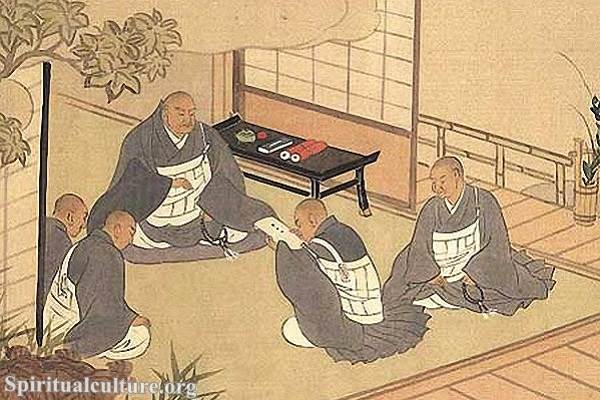Origin of Zen Buddhism school
The word “Zen” is derived from the Japanese pronunciation of the Chinese word “Chan,” which in turn is derived from the Sanskrit word “Dhyana,” which means “meditation.”
Zen Buddhism is a school of Buddhism that originated in China, where it is known as Chan Buddhism.
Zen Buddhism is believed to have originated in China during the 6th century CE when it was introduced to China by the Indian monk Bodhidharma, who is known as the “First Patriarch” of Zen Buddhism. Bodhidharma is said to have transmitted the teachings of Zen Buddhism to the Chinese monk Hui-k’o, who is considered the “Second Patriarch” of Zen.

From China, Zen Buddhism spread to Korea, Japan, Vietnam, and other parts of Asia.
In Zen Buddhism, the ultimate goal is the attainment of enlightenment or awakening to one’s true nature. This awakening is said to be the realization of the nature of the mind, which is pure, luminous, and boundless. Zen teachings often emphasize the importance of personal experience and direct realization of the true nature of the mind rather than reliance on scriptural study or theoretical understanding.
Zen teachings often use paradoxical language, riddles, and koans (short, enigmatic stories or statements) to challenge the student’s preconceived notions and to bring about a shift in perspective. Meditation is an important practice in Zen Buddhism, as it is believed to be a way to quiet the mind and gain insight into the true nature of reality.
Zen Buddhism emphasizes experiential wisdom in the attainment of enlightenment, and the personal expression of this experience in daily life, especially for the benefit of others.
The teachings of Zen Buddhism are recorded in texts such as the Blue Cliff Record and the Gateless Barrier and passed down through a lineage of teachers.
Zen Buddhism has significantly impacted the development of Buddhism in Asia and the West, and it continues to be a popular and influential form of Buddhism today.
Zen Buddhism beliefs
Zen Buddhism is a form of Buddhism that emphasizes the practice of meditation as a means of achieving enlightenment. It originated in China but has spread throughout the world and is practiced by millions of people.
Zen Buddhism teaches that the best way to understand the nature of reality and find inner peace is through the practice of meditation and mindfulness rather than through philosophical or intellectual endeavors. The goal of Zen practice is to achieve a state of calm and clarity, in which the mind is able to see things as they really are and is not caught up in judgments or dualistic thinking. Zen practitioners believe that the present moment is all that exists and that the true nature of reality can be discovered through direct, personal experience.

In Zen Buddhism, it is believed that the ultimate goal is to achieve a state of enlightenment, or realization of one’s true nature. This is often referred to as “satori” in Zen. This state is believed to be a state of great insight and understanding, in which a person is able to see the world as it truly is, beyond the veil of illusion and suffering that is created by the ego.
To achieve this state, Zen practitioners engage in various spiritual practices, such as seated meditation (zazen), chanting, and participating in retreats. The purpose of these practices is to help the practitioner quiet the mind and let go of ego-driven thoughts and desires so that they can see through the illusion of the self and experience reality as it is.
Zen Buddhism also emphasizes the importance of living in the present moment and being mindful of one’s actions. This means paying attention to the present moment rather than getting caught up in regrets about the past or worries about the future. It also means acting with compassion and understanding towards others and living in a way that is in harmony with the natural world.
Overall, Zen Buddhism is a spiritual path that emphasizes the cultivation of mindfulness, wisdom, and compassion through the practice of meditation and other spiritual disciplines. It is a path that seeks to help people find inner peace, happiness, and a deeper understanding of reality.
Zen Buddhism in Japan
Zen Buddhism was introduced to Japan in the 12th century by the Chinese monk Eisai, who wrote the first book on Zen in Japanese. Zen quickly gained popularity in Japan, and by the 13th century, there were numerous Zen Buddhism temples throughout the country. Many of Japan’s ruling elite, including samurai warriors and shogun rulers, became practitioners of Zen Buddhism.
One of Japan’s most famous Zen Buddhist temples is the Kyoto Rinzai-ji temple. This temple was founded in the 13th century and has been a center for Zen practice ever since.

Another well-known Zen temple is the Engaku-ji temple in Kamakura, which was founded in the 13th century and is known for its beautiful gardens and teahouses.

Zen Buddhism teachings had a major impact on Japanese culture and society. Zen Buddhism emphasizes simplicity, naturalness, and the importance of living in the present moment. These values were reflected in the art and literature of the time, which often depicted nature and everyday life in a simple, unadorned style. Zen Buddhism also influenced the development of Japanese martial arts, such as karate and judo, which incorporate Zen principles of mental discipline and focus.
Zen Buddhism has also had a significant influence on Japanese art and literature. The haiku, a form of Japanese poetry, was heavily influenced by Zen principles and often reflected Zen values of simplicity and mindfulness. The tea ceremony’s art, an important part of Japanese culture, is also closely connected with Zen Buddhism. The tea ceremony is a ritual in which tea is prepared and served in a special way, and it is designed to be a meditative and calming experience.
Zen Buddhism continues to be an important part of Japanese culture and religion to this day. There are numerous Zen Buddhism temples and practitioners in Japan, and Zen Buddhism teachings and practices, such as meditation, are also popular outside of traditional religious contexts.
Zen Buddhism books
There are many books available on Zen Buddhism, some of which are considered classic texts in the Zen tradition. Here are a few that you may find interesting:
- “The Zen Teaching of Huang Po: On the Transmission of Mind” is a collection of teachings attributed to the Chinese Zen master Huangbo Xiyun (d. 850).
- “The Zen Teaching of Bodhidharma” is a collection of Zen teachings attributed to the Indian monk Bodhidharma, who is considered the founder of Zen in China.
- “The Zen of Living and Dying: A Practical and Spiritual Guide” by Philip Kapleau is a modern guide to Zen practice that explores the principles of Zen Buddhism and how they can be applied to everyday life.
- “Zen Mind, Beginner’s Mind” by Shunryu Suzuki is a classic introduction to Zen Buddhism that presents the teachings of Zen in a clear and accessible way.
- “The Three Pillars of Zen” by Philip Kapleau is a comprehensive guide to the practice of Zen Buddhism, including the principles of zazen (meditation), the role of the teacher, and the cultivation of wisdom and compassion.
- “The Heart Sutra: A Comprehensive Guide to the Classic of Mahayana Buddhism” by Kazuaki Tanahashi is a commentary on one of the most well-known and revered sutras (scriptures) in the Zen tradition.
- “The Record of Linji” is a collection of Zen teachings attributed to the Chinese Zen master Linji Yixuan (d. 867).
- “The Diamond Sutra and the Sutra of Hui Neng” is a translation of two important Zen sutras, the Diamond Sutra and the Sutra of Hui Neng, along with commentary by the Zen master Taisen Deshimaru.
- “Zen in the Art of Archery” by Eugen Herrigel is a classic work that explores the principles of Zen Buddhism as they are expressed in the Japanese martial art of archery.
- “Zen and the Art of Motorcycle Maintenance” by Robert M. Pirsig is a philosophical novel that explores the connection between Zen Buddhism and the process of motorcycle maintenance.
- “Dogen’s Treasury of the Right Dharma Eye” is a translation of the writings of the Japanese Zen master Eihei Dogen (1200-1253), who is considered one of the most important figures in the history of Zen Buddhism.
- “The Zen of Seeing: Seeing/Drawing as Meditation” by Frederick Franck is a book that explores the relationship between Zen practice and the creative act of drawing.
- “Zen and the Birds of Appetite” by Thomas Merton is a collection of writings by the American monk and author Thomas Merton on Zen Buddhism and its connection to the Christian tradition.
- “The Zen of Creative Painting” by Catherine Whitney is a guide to using Zen principles to tap into the creative process of painting.
- “The Zen of Listening: Mindful Communication in the Age of Distraction” by Rebecca Z. Shafir is a book that explores the role of mindfulness and listening in Zen practice and how these principles can be applied to improve communication in our daily lives.
Common questions about Zen Buddhism
Is Zen a form of Buddhism?
Zen is a form of Buddhism that originated in China and spread to other parts of East Asia. Zen Buddhism emphasizes the practice of meditation and the attainment of enlightenment through direct, intuitive insight into the nature of reality.
Zen teachings often use paradoxical language and ask practitioners to confront and question their own assumptions and preconceptions in order to awaken the true nature of things. Zen has had a significant influence on the cultural and spiritual life of many countries in East Asia, and it has also gained a following in the West.
What are the three main ideas of Zen Buddhism?
Zen Buddhism is a school of Buddhism that emphasizes the practice of meditation and the cultivation of a direct, intuitive understanding of the nature of reality. Here are three main ideas that are central to Zen Buddhism:
- The practice of meditation: Zen Buddhism strongly emphasizes the practice of meditation as a means of cultivating awareness and gaining insight into the true nature of reality.
- The importance of living in the present moment: Zen Buddhism teaches that the present moment is all we have and that we should strive to be fully present and aware in each and every moment.
- The concept of “no-self”: Zen Buddhism teaches that the concept of a fixed, separate self is an illusion and that our true nature is one of interconnectedness and impermanence.
Does Zen believe in God?
In Zen Buddhism, the concept of God is not central to the teachings or the practice. Rather, Zen Buddhism emphasizes the attainment of enlightenment through the cultivation of one’s own mind and the realization of one’s true nature. Some Zen practitioners may believe in a higher power or a divine force, but this is not a central part of Zen Buddhism.
What is a Zen person like?
Zen is a school of Mahayana Buddhism that originated in China but which has been greatly influenced by the teachings and practices of the historical Buddha, Siddhartha Gautama. Zen practice aims to awaken one’s true nature and see things as they are without being hindered by concepts, beliefs, or preconceptions.
A Zen person is someone who practices Zen Buddhism and who strives to live in accordance with the teachings of the Buddha. This often involves a focus on mindfulness, simplicity, and living in the present moment. A Zen person may also emphasize personal development and self-improvement and may seek to cultivate qualities such as compassion, wisdom, and equanimity.
Do Zen Buddhists marry?
Zen Buddhists can marry. In Zen Buddhism, as in most forms of Buddhism, marriage is regarded as a secular affair and is not considered a religious ceremony.
Many Zen Buddhists choose to marry in a traditional Buddhist ceremony, but this is not required. Zen Buddhism does not prohibit marriage or any other type of relationship, and there are no specific rules or guidelines that Zen Buddhists must follow in terms of relationships or marriage.
Ultimately, the decision to marry or enter into a relationship is a personal one that each individual Zen Buddhist must make based on their own values and beliefs.
Do Zen Buddhists believe in an afterlife?
In Zen Buddhism, the concept of an afterlife is not a central focus, and the emphasis is on attaining enlightenment in the present life.
Zen teachings suggest that the ultimate goal of spiritual practice is to transcend the cycle of death and rebirth and to attain a state of awakening called “enlightenment” or “nirvana.” However, Zen Buddhists do not necessarily reject the idea of an afterlife. In fact, some Zen teachings suggest that after one attains enlightenment, they may continue to exist in some form, though the nature of this existence is not clearly defined.
Overall, the concept of an afterlife is not a central focus in Zen Buddhism, and the emphasis is on attaining enlightenment and living a meaningful life in the present.
Is Zen Buddhism good?
Many people find that the practices and teachings of Zen Buddhism can be helpful in improving their mental clarity, developing a sense of calm and inner peace, and finding a greater sense of meaning and purpose in life.
Whether or not Zen Buddhism is “good” for an individual depends on their personal beliefs, values, and goals, as well as how well the teachings and practices of Zen align with those. It is always a good idea to carefully consider and research any spiritual or philosophical tradition before deciding to commit to it.
What are the benefits of Zen Buddhism?
Zen Buddhism is a school of Buddhism that emphasizes the practice of meditation and the cultivation of a direct, intuitive understanding of the nature of reality. The ultimate goal of Zen practice is to achieve a state of enlightenment or awakening, in which the practitioner is able to see the world as it really is and to live in a state of spontaneous, intuitive awareness. Some of the benefits of Zen Buddhism include the following:
- Increased mindfulness and awareness: Zen meditation helps practitioners cultivate a heightened awareness and be more present at the moment. This can help to reduce stress, increase focus, and improve overall mental well-being.
- Greater self-understanding: Zen practice involves a process of self-inquiry that can help practitioners to gain a deeper understanding of their own thoughts, feelings, and motivations. This can lead to greater self-acceptance and self-compassion.
- Improved physical health: Zen meditation has been shown to have a range of physical health benefits, including lowering blood pressure, reducing chronic pain, and improving immune function.
- Improved relationships: The practice of Zen can help practitioners cultivate a sense of compassion and understanding towards others, leading to improved relationships with others.
- A Greater sense of purpose and meaning: Zen practice can help practitioners find purpose and meaning in their lives and live with a greater sense of authenticity and fulfillment.



